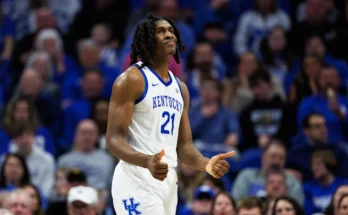Needs for the LSU Portal: Will the Tigers Fill These Two Posts? | Nick Saban Joins the La Sports Hall of Fame Class
LSU football, under head coach Brian Kelly, has consistently been a powerhouse in the Southeastern Conference (SEC), but the transfer portal has become a critical element in ensuring that LSU remains competitive on a national level. As the Tigers prepare for the upcoming season, there are two key positions that need to be addressed: the offensive line and defensive backfield. Both areas are vital to the team’s success, and filling these gaps with experienced, skilled transfers could make the difference between a good season and a championship-contending one. With the competition fierce for transfer talent, the question arises: Will LSU be able to secure these positions and continue building toward greatness?
Position 1: Offensive Line
The offensive line is one of the most important units on any football team. For LSU, it’s been an area of concern for the past few seasons, with departures, injuries, and inconsistent play affecting the team’s ability to protect the quarterback and establish a dominant run game. The Tigers lost a few key pieces from their offensive line, and while returning players have potential, the team’s success will depend heavily on securing experience and depth in this position through the transfer portal.
Current Situation:
LSU’s offensive line returns some talent, but it lacks the depth and high-end experience needed to be a dominant force in the SEC. The Tigers saw several seniors leave, including key starters who had been fixtures in the lineup for years. While players like Will Campbell and Emery Jones show promise, LSU still has concerns at tackle and guard, particularly in terms of developing a unit that can compete with the physicality of SEC defenses.
Importance of the Position:
An experienced offensive line is crucial in the SEC. LSU’s offense is built around balance, and without a strong line to protect the quarterback, the passing game is limited. Additionally, LSU’s running backs need an offensive line that can open up holes and create lanes for explosive plays. Given the aggressive nature of SEC defenses, the Tigers cannot afford to have any weak links up front.
Potential Transfer Targets:
LSU has been linked to a few high-profile offensive linemen in the portal. One of the top targets is Tennessee transfer Ollie Lane, who has the experience of playing in a high-octane offense and could immediately step in as a starting guard or tackle. Another potential option is Northwestern’s Peter Skoronski, a highly-rated tackle who entered the portal due to a change in coaching staff at his former school. Securing a player of Skoronski’s caliber would instantly upgrade LSU’s line.
Challenges in Securing the Position:
The offensive line is a difficult position to fill via the transfer portal because elite offensive linemen often don’t leave their schools unless there are extenuating circumstances. Additionally, the competition for these players is fierce, with top-tier programs also in need of offensive line help. LSU will need to not only offer immediate playing time but also demonstrate their ability to develop talent and compete at the highest level.
Position 2: Defensive Back
The defensive backfield has been a strength for LSU over the years, but with the departure of several standout players and the rise of other SEC teams with potent passing games, LSU is in need of reinforcements in the secondary. With the SEC continuing to evolve into a pass-heavy league, securing talent in the defensive backfield is more crucial than ever.
Current Situation:
LSU lost a few key contributors from its secondary, including cornerback Jay Ward and safety Greg Brooks, both of whom were instrumental in the defense’s success in previous seasons. While LSU returns some experienced players, including Kardell Thomas and Sage Ryan, there’s still a need for depth and skill at both cornerback and safety. In a conference that boasts dynamic quarterbacks like Bryce Young (Alabama) and KJ Jefferson (Arkansas), LSU cannot afford to be thin in the secondary.
Importance of the Position:
The passing game has become the focal point of many SEC offenses, and a shutdown secondary is necessary to compete at the highest level. LSU’s defense prides itself on being aggressive, but without a reliable secondary that can shut down top-tier wide receivers, the defense risks being exposed. The defensive backfield is key to LSU’s ability to continue its dominance and make deep playoff runs.
Potential Transfer Targets:
One player LSU is rumored to be eyeing is Oregon’s Christian Gonzalez, a highly talented cornerback who impressed during his time with the Ducks. Gonzalez’s combination of size and speed would make him an ideal fit for LSU’s defense, where he could start immediately and provide much-needed stability to the secondary. Another potential target is Miami’s James Williams, a rangy safety who has a knack for making big plays and could immediately improve LSU’s coverage in the passing game.
Challenges in Securing the Position:
Much like the offensive line, LSU will face stiff competition for top-tier defensive backs. Programs like Alabama, Georgia, and Florida are also targeting the same players, which could make securing these transfers difficult. Moreover, defensive backs tend to be highly sought after, and LSU will need to leverage its reputation as a “DBU” (Defensive Back University) to attract these recruits.
LSU’s Recruitment Strategy
Portal Philosophy:
LSU’s approach to the portal is a blend of immediate need and long-term potential. Under Brian Kelly, the Tigers have made it a priority to identify high-quality players who can contribute right away but also fit into the overall team culture. LSU is targeting players who have the physical tools to excel in the SEC but also the mental toughness to thrive in a high-pressure environment. With NIL (Name, Image, Likeness) deals becoming increasingly important in college football, LSU has also used its resources to make attractive offers to transfer players.
Coaching Impact:
Kelly and his staff have made a concerted effort to build relationships with transfer players, ensuring they understand the LSU culture and what it takes to succeed in Baton Rouge. The Tigers’ coaching staff has a proven track record of developing talent, and that’s a significant selling point when recruiting through the portal.
Future Outlook:
Even if LSU doesn’t land top-tier transfers at these positions, the Tigers have shown they can still recruit and develop talent from within. The staff will likely continue to build through the portal, but there is also a strong foundation of high school recruits who are already on campus or committed for future classes. This balance of recruiting both high school players and transfers is essential to LSU’s long-term success.
LSU’s success in the upcoming season will depend on their ability to address key needs through the transfer portal, particularly at offensive line and defensive back. These positions are critical to the team’s overall success, and filling them with high-quality talent will provide a significant boost to LSU’s championship aspirations. While the competition for top transfers is fierce, LSU has the resources, reputation, and coaching staff to secure the right players. Whether they can land these key pieces will determine just how far the Tigers can go in 2025.
Nick Saban Joins the LA Sports Hall of Fame Class
Nick Saban, head coach of the Alabama Crimson Tide football team, has long been regarded as one of the greatest coaches in the history of college football. His dominance over the sport, with a staggering number of national championships and SEC titles, has earned him a reputation as a true legend of the game. In 2025, Saban’s incredible career was further solidified with his induction into the LA Sports Hall of Fame. This prestigious honor is a testament to his influence on the sport and his impact beyond the football field.
Saban’s Impact on College Football
Saban’s induction into the LA Sports Hall of Fame is a recognition of his unparalleled success and his transformative effect on college football. Since arriving at Alabama in 2007, Saban has turned the Crimson Tide into a dynasty, winning multiple national championships and making Alabama a perennial contender for college football’s highest honors. His meticulous attention to detail, ability to recruit at the highest level, and penchant for adapting his coaching strategies have made him a model for success.
Saban’s legacy is one of excellence, with numerous accolades and records to his name. He is known for his ability to rebuild programs from the ground up, as evidenced by his success at LSU, Michigan State, and Alabama. Saban’s coaching philosophy has revolutionized the way college football programs approach recruiting, preparation, and development. His ability to bring out the best in his players and develop them for the next level has led to a long list of NFL stars who have come through his program.
Nick Saban’s Influence Beyond the Field
Beyond his on-field success, Saban’s impact reaches far beyond the gridiron. He is known for his leadership and mentorship of young athletes, helping them develop not just as football players but also as responsible, well-rounded individuals. Saban emphasizes the importance of discipline, work ethic, and integrity, qualities that have helped many of his players excel in their post-football lives.
Saban has also been active in charitable work, with his foundation focusing on education and the well-being of children. His leadership extends to the broader community, where his values have been a beacon for others to follow. This influence has made him not just a coaching legend but a respected figure in the world of philanthropy and community development.
The LA Sports Hall of Fame
The LA Sports Hall of Fame has a rich history of honoring individuals who have made significant contributions to sports, and Nick Saban’s induction into this prestigious group is a testament to his far-reaching impact. The Hall of Fame is home to some of the most iconic figures in sports history, and Saban’s inclusion further cements his place among the greats. As a coach who has consistently been at the top of his profession, Saban’s legacy continues to grow with each passing year.
Other inductees in this year’s class have made their own indelible marks on the world of sports, but Saban’s induction is particularly noteworthy due to his national recognition and continued dominance in college football. His contributions to the game, both on and off the field, have earned him a place in this esteemed group of athletes, coaches, and other sports figures.
Nick Saban’s induction into the LA Sports Hall of Fame is a well-deserved recognition of his incredible career and his profound impact on college football. With a legacy that spans decades, Saban’s influence on the sport will continue to be felt for years to come. As one of the greatest coaches in football history, his place in the Hall of Fame is just the latest honor in a long list of achievements. With his ability to inspire greatness in his players and his ongoing dedication to the game, Saban’s legacy is far from finished, and this honor is yet another milestone in a career that has already achieved legendary status.



